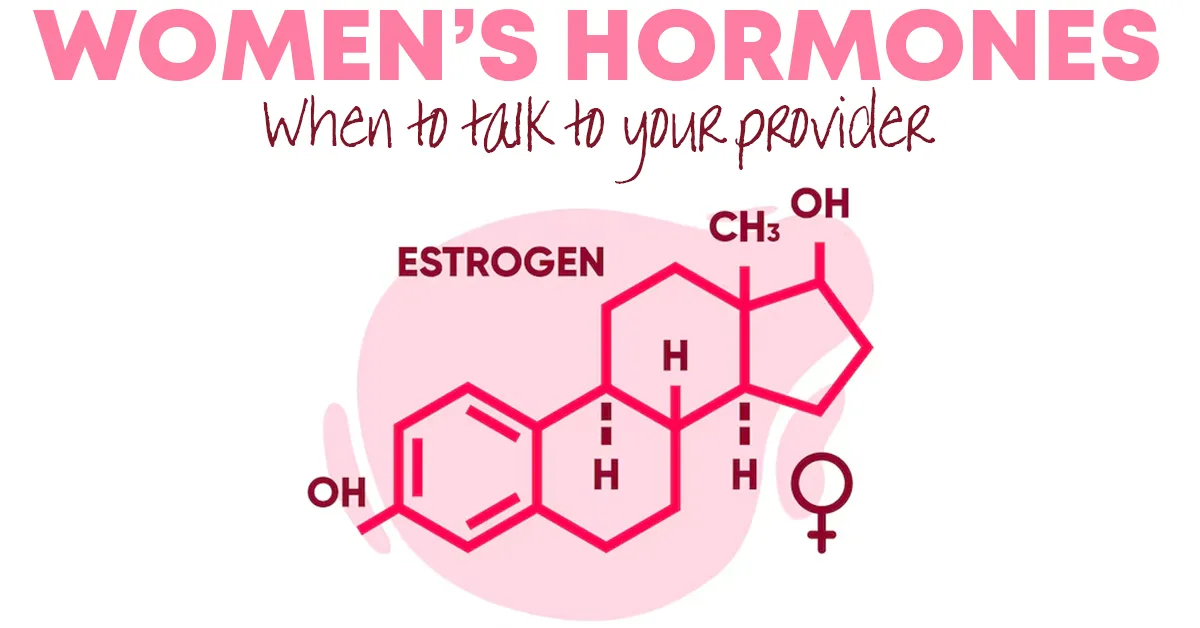There are over 50 hormones in the human body that send messages to our organs, skin, muscles, and other tissues.
Three crucial women’s health hormones are estrogen, progesterone, and testosterone. Imbalances in these can affect a woman’s cycle and their broader picture of health.
Signs of Women’s Hormone Imbalance
Women who experience any of the following symptoms should consult their medical provider.
- Heavy or irregular periods
- Recurrent acne
- Unexpected weight gain or loss
- Mood swings
- Difficulty concentrating
These symptoms are not exclusive to hormone imbalances and they could also be indicators of other health issues your medical provider could address.
Hormone imbalance can be influenced by a wide array of triggers, but stress, PCOS, thyroid disorders, and medication side effects are among the most common causes.
What is Polycystic Ovary Syndrome (PCOS)?
When your ovaries create high levels of the male hormone androgen, an imbalance called polycystic ovary syndrome (PCOS) can occur.
People with PCOS often have irregular or missed menstrual cycles, which makes PCOS one of the most common causes of female infertility. Similar to other hormone imbalances, it can also cause abnormal hair growth, acne, weight changes, and thinning hair, among other symptoms.
PCOS can occur in women at any age after puberty, and is estimated to affect up to 15% of women.
What is Endometriosis?
Endometriosis affects about 1 in 10 women. It causes the tissue that lines the uterus to grow outside the uterus.
Woman often experience severe pelvic pain as a result of endometriosis, particularly right before the start of their menstrual cycle.
Because the tissue growth that causes endometriosis is dependent on the hormone oestrogen, management of hormones can help regulate the pain.
How does Thyroid Health Affect Hormones?
The thyroid is a small gland located on the front of your neck in a butterfly shape under your voice box – near the Adam’s apple.
According to NCBI, the thyroid “plays a major role in the metabolism, growth, and development of the human body. It helps to regulate many body functions by constantly releasing a steady amount of thyroid hormones into the bloodstream.”
The thyroid produces hormones, including triiodothyronine (T3) and thyroxine (T4). These hormones play an important role in regulating weight, energy levels, internal temperature, skin, hair, nail growth, and more.
Hypothyroidism is when your thyroid produces too few hormones – this can cause heavier and more frequent periods.
Hyperthyroidism is when your thyroid produces too many hormones – this can cause lighter and shorter periods.
Your provider can do a simple blood test to see how your thyroid is working.
How do Hormones Relate to Irregular or Heavy Menstruation?
The female hormones estrogen and progesterone are critical to a healthy menstrual cycle.
If there is excess estrogen, excessive bleeding can occur, or if there is a deficiency of progesterone, the menstrual cycle can be irregular.
Stress can also influence your hormones. When you are stressed, it leads to increased cortisol production, which can disrupt the balance of other hormones, leading to a late or missed period.
How Can your Integracare Provider Help with your Hormones?
A number of Integracare providers have completed additional training to help patients manage their hormones.
Because each patient’s hormone levels are unique, providers first test a patient’s hormones, then evaluate what unique plan of care a patient may need.


